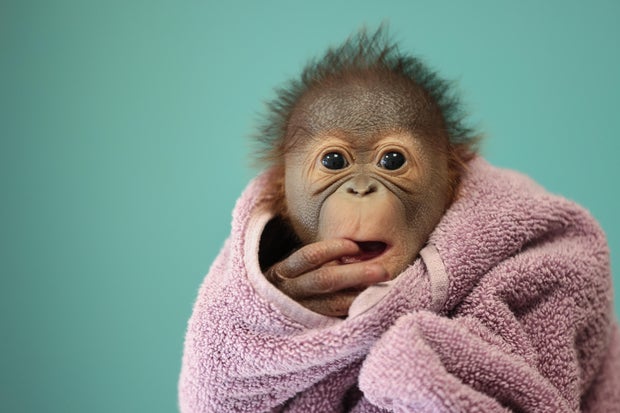An orangutan mom lost 2 babies. Then a zoo brought in 30 women to teach her how to breastfeed.
For months, 30 women breastfed their babies in front of a pregnant orangutan as part of a plan to teach the expecting mother how to care for her newborn at the Dublin Zoo in Ireland.
Mujur, a critically endangered Bornean orangutan, had given birth twice before, but both of her babies died, with Mujur failing to show the maternal qualities needed to keep them alive, the zoo said Tuesday. So when she became pregnant again, the zoo hatched a plan for a unique parenting class.
“In preparation for the birth of this newborn, Dublin Zoo has been working with Mujur for months, leaving no stone unturned in our efforts to give her the best chance possible to develop these necessary maternal qualities,” the zoo said.
Patrick Bolger/Dublin Zoo
In 2016, when the International Union for Conservation of Nature listed Borenan orangutans as a critically endangered species, the organization noted the animal’s population was on the decline. The organization estimated there were around 104,700 Bornean orangutans at the time — a sharp decline from an estimated 288,500 animals in 1973. The numbers could drop to just 47,000 by 2025, the conservation organization warned. Major threats to the species include habitat loss, illegal hunting, fires and climate change.
Orangutan females typically give birth every three to five years, and only to one infant at a time, the Dublin Zoo said. Orangutans have the longest period of dependence on the mother of any land-dwelling animal, including humans, according to the Smithsonian National Zoo. Newborn orangutans are completely dependent on their mothers for food and transportation for the first few years of their lives.
“This means that maternal qualities are absolutely vital for the wellbeing of the infant,” the Dublin Zoo said.
To teach 19-year-old Mujur the maternal skills she needed, the Dublin Zoo showed the pregnant orangutan videos of other orangutans feeding their babies. The zoo also asked for volunteers from lactation groups in Dublin and surrounding areas.
“Mujur was extremely interested in watching the women feed their babies through the glass, even mirroring some of their actions,” the zoo said.
Mujur did show maternal care toward her son after his July 31 birth, but she wasn’t putting him in the right position for feeding. The zoo typically would not intervene, but because of the importance of the newborn orangutan and his genetic profile — inherited from his father, who died in February at age 45 — the zoo ultimately separated the unnamed newborn orangutan from Mujur and began bottle-feeding him.
Dublin Zoo
He’s getting around the clock care now and will eventually be cared for by Monkey World, a specialist institution in the U.K. that’s more suited to hand-raising orangutans.
“The whole team has already fallen hopelessly in love with him, and it will be difficult to say goodbye, however we are confident that he is being sent to the best possible place for him to continue to develop and thrive,” the Dublin Zoo said.







